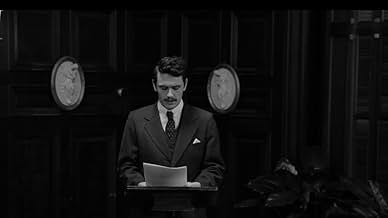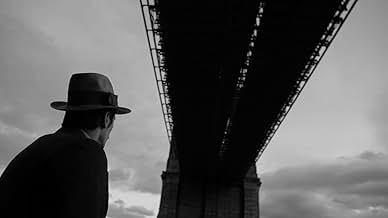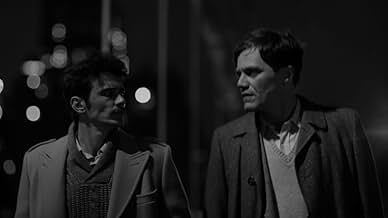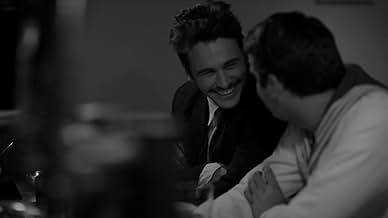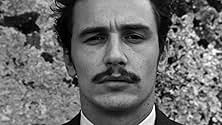Agrega una trama en tu idiomaA biography of American poet Hart Crane who committed suicide at the age of 32 by jumping off the steamship SS Orizaba.A biography of American poet Hart Crane who committed suicide at the age of 32 by jumping off the steamship SS Orizaba.A biography of American poet Hart Crane who committed suicide at the age of 32 by jumping off the steamship SS Orizaba.
- Dirección
- Guionistas
- Elenco
- Dirección
- Guionistas
- Todo el elenco y el equipo
- Producción, taquilla y más en IMDbPro
Opiniones destacadas
I know next to nothing about Hart Crane, and I don't know a lot more after having watched this movie. It's not a biography by any means. My best guess would be that it's James Franco's impression of what Crane was like, and that's what makes it interesting.
It's oddly directed, with very many long, hand-held, extreme closeups, filmed from about chest-level, of Franco (as Crane) walking the streets of various cities, usually looking up from just under his chin, but sometimes looking at the back of his head. That motif repeats often.
At least 70% of the spoken lines in the movie are Franco (always as Crane) reading Crane's poetry: one long scene reciting to an audience in a formal setting, and much poetry read as a sort of narration as various events unfold on screen. This movie definitely is not for people who hate poetry - Crane's poetry in particular.
It's definitely not for people who need action, romance, likable characters, or a clear story line in movies. It's for people who can sit through a 108-minute experimental movie without any particular expectation as to what it's going to be like.
It's for people who appreciate enthusiasm and passion in artists (I'm talking mainly about Franco, but it applies to Crane too, I suppose) even if the result is not particularly coherent. It's obvious that this was a labor of love for Franco, and that more than anything else is what makes it interesting.
Set against the backdrop of 1920's New York, Paris, Cuba, and Mexico, The Broken Tower succeeds in merging two disparate art forms, film and poetry, to propel the narrative. There's also a lot of silence in this film where we are allowed to see Crane's world as through his eyes. Elegaic sequences are punctuated with cuts to black and the spare and subtle soundtrack perfectly matches the storytelling.
I admit to knowing nothing about Hart Crane before tonight's screening but I left wanting to read his poems and letters myself.
Thank you, Mr. Franco,
wlm
You could definitely say that this movie is being a bit too artistic for my taste. It's shot entirely in black & white and doesn't necessarily follow a main plot line. It just follows its main character, without making it apparent what direction the movie will be heading at. It also makes it often hard to see what the point of certain sequences in this movie are. It makes the movie at times feel like a bit of a pointless and overlong one.
The movie definitely starts to become a bit of an endurance test after a while. I was perfectly able to take and follow the movie for its first 90 minutes or so but after that point it starts to become much harder to stay interested, also since the movie too often isn't providing you with anything interesting or provoking enough.
It's definitely not an usual biopic, that goes deep into things. You still feel that you really get to know its main subject though, through its slow and subtle storytelling. He doesn't even say all that much but he lets his poetry and actions speak for him. In that regard I really have to compliment the movie and this also was the foremost reason why I still really liked it. You might not fully get to know the real Hart Crane through this movie but it might still get you interested in him and his work.
James Franco is excellent as the movie its main character, even though he looks absolutely nothing like the real Hart Crane. It was not an easy role to play but Franco is luckily not afraid to make things hard on himself at times, which results in an interesting character and performance, that is solid enough to carry the entire movie. Since it really foremost is Franco who has most of the movie its screen time and the movie isn't focusing ever on any other characters.
But that's not all Franco did. He also directed, wrote, produced and edited it. In other words, this was a real passion project for James Franco and this luckily does show in the movie. It's a skillfully made movie, with eye for detail, that handles its main subject subtly and with real respect.
I liked it good enough and respect it but I of course do realize that this movie is not for just everyone.
7/10
http://bobafett1138.blogspot.com/
The subject of the film is the life and creative genius of Hart Crane, (July 21, 1899 - April 27, 1932) an American poet who found both inspiration and provocation in the poetry of T. S. Eliot, Crane wrote modernist poetry that is difficult, highly stylized, and very ambitious in its scope. In his most ambitious work, The Bridge, Crane sought to write an epic poem in the vein of The Waste Land that expressed something more sincere and optimistic than the ironic despair that Crane found in Eliot's poetry. In the years following his suicide at the age of 32, Crane has come to be seen as one of the most influential poets of his generation.
James Franco wrote the screenplay based on book by Paul Mariani, directed and edited the film and acted the main role of Hart Crane. Crane was a nearly disconsolate man who refused to follow his wealthy father's business, longing instead to be a poet. Born in Ohio he traveled to New York (the place he always considered home), to Cuba, and to Paris searching for his poetic voice. He was a gay man in an era when his lifestyle was always under threat, he had a lover (Vince Jolivette) early on in an affair that was filled with passion, and in his travels he seemed to find his true love in Emile (Michael Shannon) that endured the manic highs and depressive, death-haunted lows that befell this self -destructive visionary poet. He attempted suicide at least once and finally ended his life in a successful suicide at the young age of 32.
Franco breathes life into Hart Crane, offering more understanding of this enigmatic genius than we have ever been afforded. In making the film Franco uses his younger brother Dave Franco to depict the young Hart and selects his small cast wisely. The film is completely in black and white and is in the format of 'Voyages' - each voyage takes us through a distinct part of Hart's life: his gay loves, his poetry readings, his forays to Cuba and to Paris and his lonely hours of sitting before an old typewriter where he created the major epics of poetry that remain some of the finest ever written by an American poet.
The film is choppy, not unlike the manner in which Hart's mind worked in bits and pieces, always immersed in thoughts of the sea, the labor of common man, of the Brooklyn Bridge which would play the major role in his most famous epic poem THE BRIDGE, and of the fellow artists whose work he so admired. There is a strange musical score (the work of Neil Benezra) which is long on choral chanting, and a quality of gritty cinematography achieved by Christiana Vorn. The technique of the making of this film matches the vision of James Franco in continuing to visit the lives of isolated geniuses. The dialogue, what little there is, is Crane's poetry as spoken by Franco.
For many this film will seem self-indulgent on Franco's part. And perhaps it partially is. But the flavor of this gay American poet of the 1920s and the reflections of America at that time ring true. THE BROKEN TOWER is not a biopic of Hart Crane. It is an elegy.
Grady Harp
¿Sabías que…?
- TriviaShot in three countries and 30 locations in 15 days.
- ErroresThe dress, hair, and make-up of the Peggy character are all wrong for 1931.
- Citas
Gorham Munson: Hart, forgive me for saying this. But you want to speak for America.
Hart Crane: Yeah.
Gorham Munson: Does it matter that you're queer?
Hart Crane: [Annoyed, rolls eyes] Whitman was queer. That's why he could love *all* of America. The roustabouts. The slaves. The, the soldiers he nursed in the Civil War.
Gorham Munson: So you will expose yourself?
Hart Crane: It's funny, considering my truckdriver left me. No. People can know everything about us when we're dead. But for now, it's better to keep quiet. For father's sake.
Gorham Munson: [sarcastically] Right. You wouldn't want to lose that tremendous job for the sake of some queer affirmation.
- ConexionesReferenced in Hart Crane: An Exegesis (2012)
Selecciones populares
- How long is The Broken Tower?Con tecnología de Alexa
Detalles
- Tiempo de ejecución1 hora 39 minutos
- Color
- Relación de aspecto
- 1.85 : 1
Contribuir a esta página



